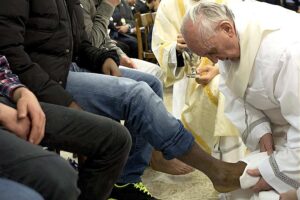“Preach the Gospel at all times, and when necessary, use words.”
Fr Austin’s words to me after Easter Sunday mass yesterday, quoting St Francis of Assisi.
I was having a short conversation with him on the subject of priests and their sermons, having been asked by BBC Radio Ulster to go on air this morning to talk of how priests might improve their weekly homily.
Ironically, in an example of miscommunication, Radio Ulster had been led to believe that Pope Francis had called upon priests to up the ante with their weekly homily. As it transpired the new Pope didn’t say this at all. It referred to a much earlier comment by Cardinal Ravasi back in November 2011 for priests to embrace new media in their communications. He pointed to the likes of Twitter as a media that would appeal to the younger generation. The Catholic Herald reported:
“A Vatican cardinal has appealed to clergy to liven up “dull, flavourless” sermons in an address at a conference in Rome.
Cardinal Gianfranco Ravasi, president of the Pontifical Council for Culture, claimed that homilies had become “irrelevant” to worshippers who were used to the thrill and excitement of modern technology such as the television and the internet. He said: “The advent of televised and computerised information requires us to be compelling and trenchant, to cut to the heart of the matter, resort to narratives and colour.”
Fr Austin’s comments on St Francis immediately steered my thoughts to our modern day Francis. Certainly the new leader of the Church is aware of the power of words, but his signature so far has been actions, not just what he has said. Both bear close scrutiny. Since the announcement on 13 March he has dispensed with much of the starch, stiffness and conservatism that Pope Benedict brought to the office.
Last Thursday he said mass and washed the feet of juvenile inmates in Rome’s Casal del Marmo juvenile detention facility. This in turn prompted a series of open letters from young inmates in an LA Correctional Facility including the following:
Dear Pope Francis,
When Jesus washed the feet of his friends he gave an example of humility. I have been raised to believe that it is only with respect in hurting your enemy that you are a man. Tonight you and Jesus show me something in this washing of the feet something very different. I hope we kids learn from this.
Dear Pope Francis,
I have never been to Rome. I do not know if it is near Los Angeles because all my youth I have only known my neighborhood. I hope one day I will be given a second chance and receive a blessing from you and maybe even have my feet washed on Holy Thursday.
Since being elected, the Argentine Jesuit has eschewed the trappings of office. He has declined to wear the elaborate red, ermine-trimmed Mozetta favoured by Benedict. His choice of residence, the Domus Sanctae Marthae rather than the expansive top floor Papal Apartment in the Vatican. He has gone walkabout to meet real people and ventured off script frequently. His message at the Chrism Mass on Holy Thursday was an appeal to Priests to go to the outskirts to minister to those at the margins. A challenge for the times we live in, if ever there was one.
Returning to Cardinal Ravasi’s original exhortation on the Priest’s weekly sermon, those people at the margins may not be present in the Chapel every Sunday. Nor are they necessarily open to the appeal of social media. Many feel they no longer form part of the broader Church. And, the institutional Catholic Church in turn has damaged itself with them, with its failure to adequately address the failures of priests and religious implicated so disastrously in child abuse and the subsequent failure of the Institution to deal with the victims in a meaningful way. A culture of us and them has evolved and developed and grown exponentially. The communication has been poor.
Priests in Ireland that have dared critique aspects of the institutional Church’s behaviour have been censured and silenced. Often they are respected local clergy, men and women whose stock clearly doesn’t rank high in Rome with the Curia. Little to commend there, in examples open communication, clarity of message and freedom of expression. It has become unhealthy. A case of ‘do as I say not as I do’. The Curia in Rome under the Benedict regime has been allowed to strengthen its hand, and instead of showing openness, welcome and forgiveness it has closed ranks. Benedict in some of his keynote addresses has used Latin. That in itself is anti-communication and displays however unintentionally a Church that is out of touch and not of its time.
The New Pope Francis on first impression, offers an alternative and possibly a last chance for the Church reinvigorate its true mission. He is thus far an inspiring Shepherd. The excellent blog Whispers in the Loggia allows watchers to absorb word and deed from Francis. Although aware of the strengths of modern communication, he has shown himself thus far to have mastered the art of the simple message irrespective of the medium. It harks back to a simpler Church with a more powerful mission.
Fr Austin’s reflection on the words of St Francis have never been truer.
“Preach the Gospel at all times, and when necessary, use words.”
‘It’s about what you do Joe’ he said to me as a parting remark, ‘not what you say.’ As an Easter message from the Pope, or in this case the local Parish Priest, it couldn’t come simpler or more relevant than that.

